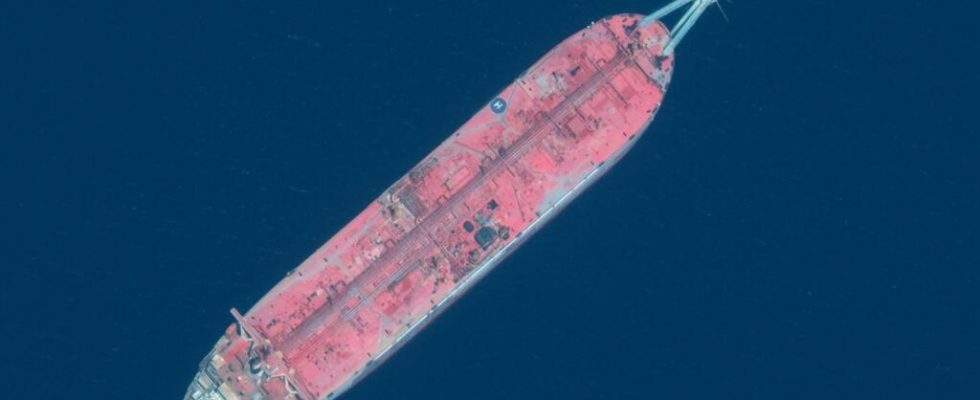The FSO Safer, a supertanker loaded with more than a million barrels of oil, has been abandoned off the coast of Yemen since the start of the war in 2015. On March 9, the UN announced the purchase of a gigantic tanker to prevent the tanker from sinking in the Red Sea. David Gressly, UN coordinator of humanitarian aid in Yemen, responds to RFI.
RFI: Why speak of a “ time bomb » off Yemen ?
The FSO Safer is an oil storage vessel that has been off the port of Hodeidah since 1988. It was originally used to facilitate the export of oil to eastern Yemen. But since the beginning of the war, eight years ago, it has been abandoned with 1.1 million barrels of oil on board. The ship is no longer maintained and it is deteriorating.
►Also read: Yemen: concern is growing over the risk of an oil spill in the Red Sea
Normally, these boats are equipped with systems to limit the risk of fire: “inert gases” are diffused into the cargo tanks. But now, this gas has disappeared on board for at least four years. This means that the slightest flame, the slightest spark can cause the ship to explode, sink and release into the ocean the equivalent of more than a million barrels of oil. Besides lack of maintenance, the ship has become fragile and also threatens to break.
The risk of disaster is enormous. We are facing a risk of an oil spill that could affect African countries, Eritrea, Somalia, Djibouti and block the Strait of Bab-el-Mandeb. This disaster can happen tomorrow. It is very serious, because it is no longer a question of whether this catastrophe will happen, but when it will happen. This is why we must act.
On March 9, the UNDP (United Nations Development Program) announced a plan to avoid this catastrophe, with the purchase of a huge tanker, intended to unload the cargo from the tanker. How will this operation take place? ?
The mission is very simple. We found a ship via the Euronav company to unload the oil stored on board the FSO Safer. However, we also need to prepare for the operation. For this, we work with a Dutch company. Its mission will be to restore on board the tanker these inert gases which aim to limit the risk of fire.
This company will also be responsible for repairing the tanker where necessary, installing floating barges all around to avoid any leakage or accidental spillage of oil. The operations should last a total of ten weeks. It’s not very complicated in terms of logistics, but it’s a major project. And we, we must do it as soon as possible to avoid a catastrophe.
The problem is that the funds are still lacking ?
That’s right. We have enough funds to finance the ship that will unload the oil, but we still lack the money to carry out the securing operation. This is why we are asking Member States and the private sector. We have already raised approximately $95 million.
And we launched a online crowdfunding campaign which allowed us to reach $250,000, a quarter of our goal. It’s still not enough. This is why with this new funding round, we hope to be able to raise an additional 250,000 dollars and reach half of our objective. This will allow us to solve this problem as soon as possible, and we must raise these funds quickly.
At the same time, war continues to rage in Yemen. And there too, the UN needs funds. The last donors’ conference, on February 27 in Geneva, brought together 1.2 billion dollars in pledges. This is almost four times less than expected. Today, where are the priorities ?
First of all, there is the question of food insecurity aggravated by a very difficult economic situation. Thousands of businesses disappeared with the conflict, leaving people without income. Public services, access to water and health must be maintained. If we don’t, these services risk collapsing and will be very difficult to restore.
We are also very concerned about issues of social protection and inclusion. We have over 4.3 million displaced people today. It is therefore a combined effort focusing on food security, nutrition and water. This massive crisis can only be resolved through peace. But while waiting for peace, we need funding.
On March 10, Iran and Saudi Arabia, both engaged in a proxy war in Yemen, announced the restoration of their diplomatic relations. Have you ever noticed an evolution on the ground ?
The restoration of relations between States is always welcome. However, I think the most important thing, in terms of benefits for the people of Yemen, is the truce which began almost a year ago, on April 2, 2022. Even if it was not renewed, it has been widely respected and benefits the Yemeni people. I’ve seen it over the past year: the fuel is coming, businesses are picking up, and people are having incomes again.
Stopping airstrikes is psychologically very positive for people. As we have just entered the month of Ramadan, I have seen more shops and restaurants open, people move more freely. A lot of things have been done and I think we need to encourage peace negotiations.
